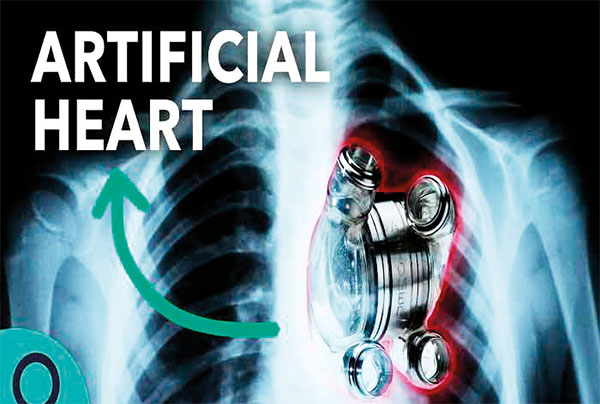The world’s most advanced and reasonably priced artificial heart, also known as a left ventricular assist device, is being created in India (LVAD). Because an artificial heart is one of the most difficult machines to construct, it is being hailed as the future of healthcare worldwide.
An artificial heart, also known as a left ventricular assist device (LVAD), is a pump used in patients with end-stage heart failure as a temporary fix while they wait for a heart transplant or as a long-term solution for those who are unable to receive a transplant. It is a mechanical implantable pump that works with the left ventricle, the heart’s main pumping chamber, to assist circulate blood throughout the body.
IIT-School K’s of Medical Research and Technology (SMRT) in Uttar Pradesh has announced the beginning of Hridyantra, a grand challenge-based program to create the most cutting-edge Artificial Heart or Left Ventricular Assist device in the world (LVAD). The SMRT is a hub for multidisciplinary instruction and study across several branches of medical technology and science.
The campaign will promote the idea of “made in India for the world” in partnership with some of India’s top hospitals. A task force made up of business professionals has chosen a group of innovators with the necessary experience. The leading cause of death worldwide, cardiovascular disease accounts for up to 32% of fatalities. The logical option is to install a Left Ventricular Assist Device (LVAD) to replace the damaged heart with an artificial one. But a solution isn’t truly a solution if it’s out of your price range.
Dr. Devi Shetty, a cardiac surgeon and the Chairman and Founder of Narayana Health, a chain of 24 hospitals and seven heart centers, believes that when an artificial heart costs approximately INR 10 million in India and more than a million dollars in the United States, it is not a viable option.
Only 29,000 wealthy patients worldwide have had mechanical hearts installed.
Basic scientific, medical, and engineering graduates, as well as graduates from any stream who have relevant experience, are welcome to take on the challenge of creating India’s first LVAD system. The mentor group currently includes some IIT Kanpur alums who have moved abroad and have a wealth of experience in creating devices to help failing hearts.
Out of more than 200 applicants, the SMRT selected eight for the team. The artificial heart will be constructed on the IIT Kanpur campus by this team, who will also have the Intellectual Property (IP) rights to eventually commercialize it and reimburse IIT K with a fair royalty. Once the LVAD is successfully commercialized and deployed, the chosen candidates will earn a fellowship and a milestone-based ownership in the commercial organization.
IIT Kanpur is renowned for playing a pioneering role in the launch of high-impact projects in the disciplines of entrepreneurship and innovation, according to Prof. Abhay Karandikar, the institute’s director. By providing vital R&D support to indigenous talent, we are taking another step toward fulfilling our vision of an Atmanirbhar Bharat (Self-Reliant India) via Hridyantra.
The program, which offers an innovative platform for resourceful problem solvers, will not only improve the nation’s health ecosystem but also pave the road for multidisciplinary biomedical research and innovation, he continued. This is our moonshot initiative, and its success will determine the road forward and inspire everyone who is participating.
In order to support the chosen fellows in developing the Artificial Heart, the SMRT has assembled a strong task force that includes engineering faculty members from IIT Kanpur, business experts from the USA, and clinical experts from Narayana Health, All India Institute of Medical Sciences-Delhi (AIIMS Delhi), Apollo, Fortis Healthcare, Medanta, KIMS, and UN Mehta Heart Institute. The most prominent and significant program for the innovation of medical devices in India is called Hridyantra.
IIT-K alumni contributed the project’s first money, and future funding will come from grants and donations from public and private funding organizations. The “world’s most advanced artificial heart” will be created by the IIT-K, not the “world’s cheapest artificial heart.” Given that grants and donations are covering the full development cost, it will be reasonably priced.
“The model developed by IIT-K is a game-changer,” claims Dr. Devi Shetty. It offers a fantastic platform for budding businesspeople. Prime Minister Narendra Modi’s vision of a self-sufficient India will be realized in less than ten years if all IITs and government-funded research institutions adopt a similar approach to creating moonshot initiatives.

